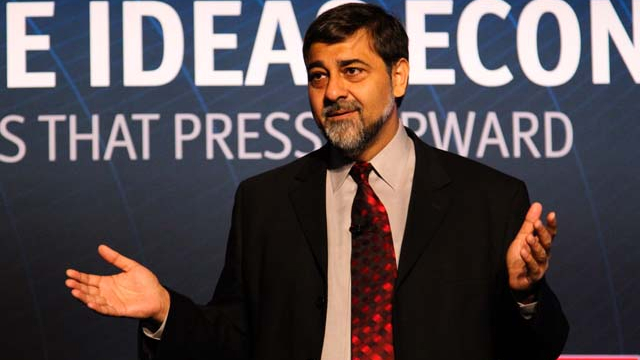bigthinkeditor

Nature is smart, efficient and innovative. That’s why scientists and engineers all over the world try to copy it in their labs. The field concerned with imitating nature is called biomimetics.
Seven years before Charles Darwin went public with his evolutionary theories in On the Origin of Species, Herbert Spencer sketched out the basics of evolution and natural selection.
Two management consultants identify four guiding principles successful companies have followed to prepare for a world of constant Internet connectivity.
Four out of five autism sufferers are male. Are fundamental male-female brain differences causing the gap?
In a panel near the end of Farsight 2011, several panelists spoke about how the sheer quantity of information around us is affecting the way we think — and even how our brains are developing.
In a special presentation at Big Think’s Farsight 2011, Ilya Segalovich, co-founder and CTO of Russian search engine Yandex spoke about why his company has been dominant in that country’s […]
The fourth part of Big Think’s Farsight 2011 event discussed what future search experiences might be like. People instinctively want to interact with technology in ways that feel natural to […]
Facebook and other social media are becoming permanently woven into our society’s fabric, says NYU telecommunications professor Clay Shirky. Privacy is a 20th century notion.
Part 5 of Big Think’s Farsight 2011 event looked at how artificial intelligence and machine learning would affect the future of digital search — and how we understand and predict the future.
Any actions associated with zero costs tend to become debased over time, says technologist Jaron Lanier. Search is no different.
In part 2 of Big Think’s Farsight 2011 event Principal Engineer at Google, Matt Cutts and Corporate Vice President at Microsoft Dr. Harry Shum bump heads.
Vivek Wadhwa introduces the key note speaker of Big Think’s Farsight 2011: Beyond the Search Box, former PayPal CEO Peter Thiel.
Accusations that Microsoft’s search engine Bing has been copying Google’s search algorithm came on the same day that Bing and Google execs are set to meet at a Big Think event in San Francisco on the future of search. Watch the event streaming on our homepage from 1pm-5pm EST.
The arts start the conversation. When the world is saved—and it really does require saving—the door will be opened through the arts and then the politicians. Then the policies will follow.
A row has broken out in France over whether teenagers should be allowed to genetically modify bacteria in the classroom.
A new study suggests that small meteorites may survive their plunge through Earth’s atmosphere intact much more often than previously suspected.
A brisk stroll every day helps improve memory in old age and wards off dementia, a study finds.
The L.A. Times says the revolt in Egypt is an indigenous and broad-based movement galvanized by decades of corruption and poverty and the U.S. should let events play out.
Cameron’s plan to flog the public forest estate is opposed by 84% of the public. Stupid and destructive as this sell-off promises to be, it’s a stone’s throw from really interesting.
French researchers have corroborated studies which have revealed associations between an omega-3/omega-6 imbalance and mood disorders.
Last year, the Obama administration pushed through an ambitious transformation for NASA and turned to the commercial sector for astronaut transportation.
Closing our eyes allows us to simulate a decision more extensively and seems to make us more sensitive to the ethical nature of our own and others’ decisions.
Sometime during the next couple of years, there will likely be a fundamental shift (which) could lead to food and water shortages — and test our personal and community preparedness.
Social media sites have been credited with helping protesters in Egypt organize and spread news before the government blackout. But is the importance of communications technology to modern revolutions overblown?
It’s clear that green technology strengthens our security and helps the environment, but can it be economically advantageous also? Harvard Business School professor Robert Eccles believes so.
The disorder isn’t really on the rise—it’s just getting defined better, and diagnosed more frequently, explains Dr. Gerald Fischbach of the Simons Foundation.
Amazon has revealed that it has sold more Kindle ebooks than paperbacks in the U.S. during the final three months of 2010. The milestone has come sooner than expected.
Many people think with either their wallets or their stomachs. Taking advantage of that by taxing meat products could reduce greenhouse gas emissions.
Scientists have identified a brain pathway which, when defective, leads to an uncontrollable desire to smoke. The discovery may lead to new anti-smoking treatments.
Pay attention, marketers. If any study validates what you do, this one does. Researchers found that using a generic (vs. brand name) product undermines self-esteem.












